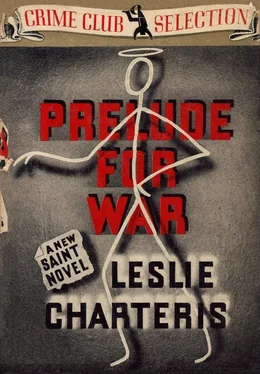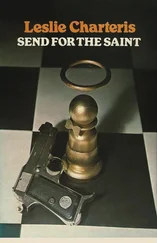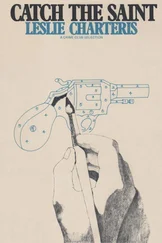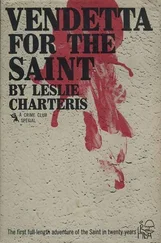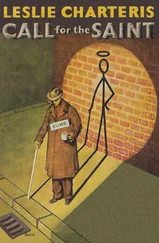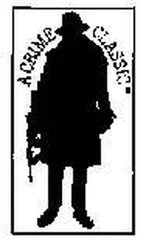"Well, well, well," he said. "Listen, Claud. What do you make of this? 'We should like your readers to ask themselves where this criminal association calling itself the Sons of France obtains its funds and the store of arms which Colonel Marteau has so often boasted that he has hidden away for the day when they will be needed. And we ask our readers, how long will they tolerate the existence of this terrorist organization in their midst?' "
He picked up a second scrap of paper from the floor. Again there was a blue-pencilled paragraph.
" 'M. Roquambert, in a vitriolic speech to the Chamber of Deputies last night, urged on the government the necessity for a greatly increased expenditure on armaments. "Are we," he demanded, "to suffer the Boche to batter once more on the gates of Paris?" ' " Simon let the cuttings flutter out of his fingers. "I seem to remember that Comrade Roquambert is one of the heads of the Sons of France," he said. "Doesn't that interest you?"
"What was wrong with that verdict?" Teal repeated.
The Saint looked at him, and for once there was no mockery in his eyes.
"I think it would be a good idea if you started investigating two murders instead of one," he said.
Which was undoubtedly a highly effective and dramatic exit line, Simon reflected, as the Hirondel roared westwards again towards Anford; but how wise it had been was another matter. It had been rather a case of meeting trouble halfway and taking the first smack at it. In the course of his inquiries Teal would inevitably have discovered that Kennet had shared the flat with Windlay, and Simon knew only too well how the detective's mind would have worked on from there directly the inquest headlines hit the stands. The Saint had had no option about taking the bull by the horns, but he wondered now whether he might have achieved the same result without saying quite so much. Chief Inspector Teal's officially hidebound intelligence might sift slowly, but it sifted with a dour and dogged thoroughness. Simon realized at the same time that if he had an adequate alibi for the period during which Windlay might have been killed, Luker and his satellites had an alibi that was absolutely identical — it gave him an insight into the efficiency of the machinery that he had tampered with which was distinctly sobering, and he had plenty to think about on the return journey.
Patricia was waiting for him when he stopped the car on Peter's drive. He picked her up and kissed her.
"You look good enough to eat," he said. "And that reminds me, I haven't had any lunch. Where are the troops?"
"Peter's keeping an eye on your menagerie," she told him. "I came back and sent Hoppy over to keep him company. They're all at the Golden Fleece, and when Peter last phoned Hoppy was just starting on his second bottle of whiskey. Did you find Windlay?"
"I found him," said the Saint stonily. "But not soon enough."
In the kitchen, over a plate of cold beef and a tankard of ale, he told her the story in curt dispassionate sentences that brought it all into her mind as vividly as though she had been there herself.
"It only means that we were right, darling," he concluded. "Kennet had something that was big enough to commit murder for. There wasn't any accidental-death hokum about Windlay. Somebody knocked on the door and gave him the works the minute he opened it. And the whole flat was torn into small pieces. It must have gone on while we were all footling about at that inquest acquiring beautiful alibis — these ungodly are professionals!"
"But did they find what they were looking for?"
"I wish I knew. Bur there's a hell of a good chance that they didn't, since they made a mess like that. I wish I knew exactly what the prize was. It seems to me that it must have been a fair-sized dossier — something that wouldn't be too easy to hide. And unless Kennet was a certifiable lunatic he wouldn't have brought that to Whiteways without leaving a duplicate somewhere. Hence the battle of Balaclava Mansions." He pushed his plate away and scowled at it. "If only that damned girl could remember a bit more of the things Kennet told her! He must have spouted like a fountain, and she simply didn't listen."
"Why don't you see her again?" suggested Patricia. "You might be able to jog her memory or something. Anyway, you'd have a good time trying."
Simon looked up at her from under impenitently slanting brows.
"Are you insinuating that a man of my unparalleled purity—"
"You'll have to hurry if you want to catch her today," Patricia said practically. "Peter found out from one of the chauffeurs that they're starting back to London at five-thirty."
The Saint stood up restlessly.
"I think I'd better amble over," he said.
Again the Hirondel roared over the Anford road, and a few minutes later it swung to a grinding stop in the small courtyard in front of the Golden Fleece. As Simon stopped the engine and hitched his long legs over the side he glanced around for a glimpse of his confederates. The maternal laws of England being what they were, Hoppy must have been torn away from his second bottle about three hours ago, and it would be another half-hour before he would be allowed to return to it. Simon scanned the landscape for some likely place where the thirsty vigil might have been spent, and he became totteringly transfixed as his eyes settled on the window of an establishment on the opposite side of the road, next to the Assembly Rooms, over which ran the legend; Ye Village Goodie Shoppe.
Peter Quentin was stoically reading a magazine; but on the other side of the table, bulging over the top of a chocolate eclair, the frog-like eyes of Mr Uniatz ogled Simon through the plate glass with an indescribable expression of anguish and reproach that made the Saint turn hastily into the hotel entrance with his bones melting with helpless laughter.
The first person he saw was Valerie Woodchester herself. She was sitting alone on the arm of a chair in the lounge, smoking a cigarette and swinging one shapely leg disconsolately, but at the sight of him her face brightened.
"Oh, hullo," she said. "What's the matter?"
"Some things are too holy to talk about," said the Saint, sinking on to the chair opposite. "Never mind. Perhaps you can bring me back to earth. Are you always being left alone?"
"The others are upstairs having a business conference or something." She studied him with fresh and candid interest. "Where have you been all the afternoon? You simply seemed to vanish off the face of the globe. I was afraid I should have to go back to town without seeing you again."
"Then why go back to town?" he asked. "You could come over and join us at Peter Quentin's. There's a spare bed and a dart board and plenty to drink, and we could see lots more of each other."
For a moment she looked a little hesitant. Then she shook her head quite decidedly.
"I couldn't do that. After all, two's company and all that sort of thing, you know, and anyhow I don't think it would be good for you to see much more of me than you did when we first met." A little smile touched her lips and gleamed in her dark eyes. "Besides, I'm quite sure Algy Fairweather wouldn't like it. He's been warning me against you. For some reason or other he doesn't seem to approve of you an awful lot."
"You amaze me," said the Saint solemnly. "But does it matter whether Comrade Fairweather approves or not?"
"Well," she said, "a girl has to struggle along somehow, and Comrade Fairweather is a great help. I mean, if he has a man coming to dinner, for instance, and he doesn't want him to concentrate too hard on business, he asks me along and pays me for it. And then I probably have to have a new dress as well, because of course you can't stop a businessman concentrating in an old piece of sackcloth, and I never seem to have any new clothes when I need them."
Читать дальше
